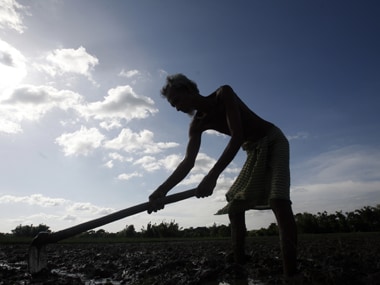The hailstorm in parts of central India including parts of Maharashtra, considered to be the worst in Maharashtra’s history and having affected almost 28 districts, has stirred politics across the state, turning into a potent agenda as Lok Sabha elections approach. Fearing a change in rural voting patterns on acocunt of the latest calamity, leaders from all political parties have rushed to woo the farmers, already suffering the debilitating impacts of the severe droughts in 2011 and 2012. Most have made a beeline for hailstorm-affected areas, insisted upon immediate relief packages and more. [caption id=“attachment_1442837” align=“alignleft” width=“380”]  Reuters[/caption] According to state government officials, around 20 lakh hectares of farm land spread across 28 districts in the state were hit by heavy rain and hailstorms since the last week of February. Crop including grapes, oranges, bananas and pomegranates and also, wheat, jowar and cotton have been affected. The hailstorm-hit farmers’ issue took centrestage when the BJP’s prime ministerial candidate Narendra Modi held a rally in Wardha and visited hailstorm-affected areas of Vidarbha last week. Prior to that, almost all the senior leaders from the political parties including Union Agriculture Minister and NCP president Sharad Pawar, Maharashtra chief minster Pritiviraj Chavan, BJP leader Gopinath Munde, Maharashtra Navnirman Sena (MNS) chief Raj Thackeray toured the hailstorm-affected areas of Marathwada and Vidarbha regions. Political leaders and analysts believe that it is going to be a crucial issue in the Lok Sabha elections in next month. “The farmers are angry with the ruling Congress-NCP government as it has failed to address farmers’ issues. Though we faced severe drought in 2011 and 2012, the state government did not provide enough relief to us. The government only announces the package which never reaches farmers. At present, the mood of the farmer community is against the Congress and NCP,” said Raju Shetty, a sitting MP and Lok Sabha candidate of the Shiv Sena-BJP combine from the Hatkangale constituency in western Maharashtra. He is also the president of Swabhimani Shetkari Sanghtana, a farmers’ organisation with a large base in western Maharashtra, Pawar’s stronghold. The state government has decided to provide special package of Rs 4,000 crore to farmers whose crops were hit by unseasonal hailstorms, with permission from the election commission. It has also released Rs 260 crore as a first instalment. “This relief package is just a gimmick by the ruling parities. Half of the funds from the drought package announced in last year has not yet reached to the farmers. In addition, the red-tapism and corruption in the administration will eat half of the funds,” said Wamanrao Chatap, a former MLA from Chandrapur and Aam Adami Party (AAP) candidate from the Chandrapur Lok Sabha constituency. Chatap has been associated with Shetkari Sanghatana, another farmers’ organisation, for more than four decades. In January 2013, the government announced a Rs 778-crore package under the National Disaster Relief Fund. Subsequently, in March last year, the union government also announced a drought relief package of Rs 1200 crore. Only a few months previously, in the monsoon session of legislature, the government had announced a Rs 2,625-crore package for water supply, irrigation schemes and water conservation programmes in drought-hit areas. “The farmers are now looking for a strong alternative. So, it is likely that they will either vote for Shiv Sena-BJP or AAP depending on the candidate and the region,” Chatap said. Political analysts are of the view that the change in voting pattern of the farming community, due to hailstorm and the severe back-to-back droughts, will be based on the relief package. “Normally, the farmers’ community votes for the Congress and NCP and it is likely to vote for them in this election. The hailstorm will have little impact in the election due to the institutionalized base of the Congress-NCP in the credit societies and district cooperative banks which play a major role in providing loans to farmers,” said Prakash Bal, a political analyst. Bal added that a section of farmers may not vote in the election due to the agrarian crisis. “Farmers are accustomed to agrarian crisis. They only need the immediate relief package. But, it will have an impact on voting and some of them may not vote in the upcoming election,” he elaborated. Surendra Jondhale, another political analyst said that the change in voting pattern will largely depend on how quickly the relief package is provided. “In the Indian electoral scene, the issues that crop up prior to elections have strong impact on voting. So, the severe drought in 2011 and 2012 will not have any impact now. If the state government is able to provide the relief package effectively and quickly to hailstorm-hit farmers, then it will help the ruling Congress-NCP. There will be an adverse impact only if it fails do so,” said Jondhale. However, some other experts believe farmers will vote against the ruling government. “The relief package will not help the farmers because it has created a depression in their minds. The farmers are aware that the relief package will not reach them in time and the amount will be inadequate. That’s why we’re seeing suicides as farmers are not able to cope up with the huge losses. Since cash crops like grapes, oranges and pomegranates have been destroyed, the farmers will never recover their losses. So, they will vote against the ruling government,” said PG Jogdand, head of the department of sociology in Mumbai University.
Back to back drought in 2011 and 2012 followed by the hailstorm this year have caused huge crop loss. The relief package will be an important election agenda.
Advertisement
End of Article


)
)
)
)
)
)
)
)
)



